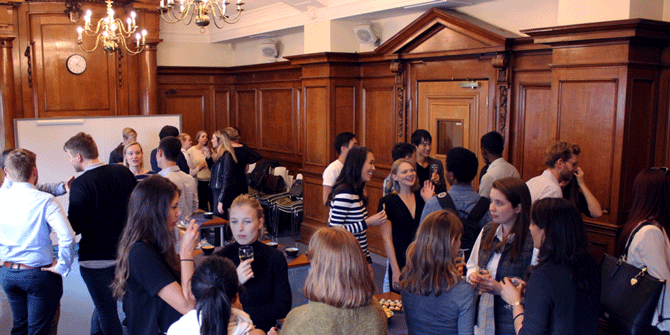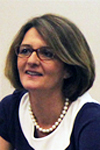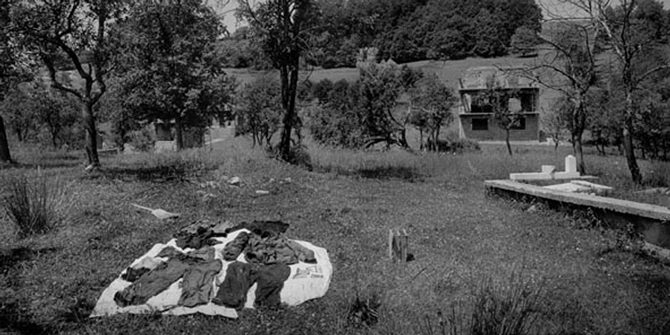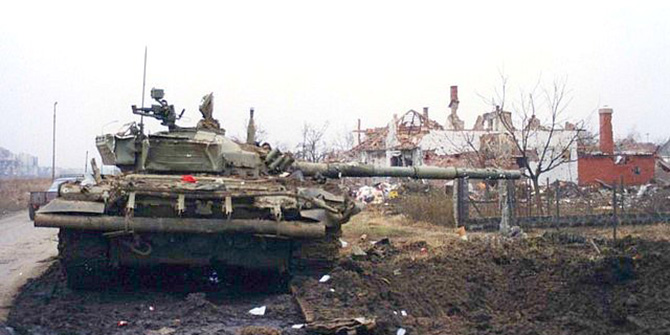Dr Denisa Kostovicova details the Conflict Research Group (CRG) lunchtime research seminars and public events, organised during term times since 2011, in her ‘Building a research community: involving academics, doctoral students and master’s students in the Conflict Research Group seminars’.
The Conflict Research Group (CRG) is a multidisciplinary group based at the Department of Government that gathers staff and students who are interested in the study of conflict from across the School. It has been organising CRG lunchtime research seminars during term times since 2011. The speakers have included a range of senior and junior scholars, as well as doctoral students, discussing a range of questions that align both with the academic content and with the pedagogical aims of MSc Conflict Studies. They have tackled topics related to the analysis of violent conflict and its management or resolution, including: Why does it happen when it does, and where? Why do conflicts change over time? What can be done to manage or resolve a conflict? What is the role of international politics, or civil society?
Dr Denisa Kostovicova who has coordinated the seminar series since 2011, and currently convenes MSc Conflict Studies told us, “Our aim was to encourage a vibrant research culture around conflict studies, with scholars presenting cutting-edge work, but to do so by involving Masters students. The seminar series greatly enriched their educational experience at the LSE, and what we have to offer. But, I must also add that our students have challenged the most prominent scholars in the field with sharp and astute questions.”
The students appreciate the link between day-to-day teaching and seminars, Denisa explained. Quotes from participants included:
“I found the lunchtime seminars particularly helpful and stimulating because it presented the latest findings in the field. It also allowed the students to engage with the topic and the scholars one to one by opening the space for questions and discussions. I found it helpful to have one of our professors attend and ask the right questions and sometimes highlight relevant topics or debates discussed in our classes.”
“I found the Conflict Research Seminars to be as rich compliment to the Conflict Studies coursework. The seminars covered a considerable range and also provided an opportunity out of the classroom to delve deeper into topics that were touched on in lectures.”
Students also seem to value the opportunity to meet the speakers informally for an extended discussion before or after the seminars. These meetings can be helpful not just to elaborate on their interests in abstract terms, but are also especially helpful for developing dissertation proposals, as testified by one student:
“The Conflict Research Group lunchtime events have provided an extra dimension to this Conflict Studies masters year. The lunchtime talk by Dr Maria Koinova (Reader in International Relations at the University of Warwick) on diasporas in particular inspired me to conduct my own research on diaspora organisations for both a summative essay and now my dissertation. Many other talks throughout the year have provided further depth to this year’s study programme, and it has been really beneficial to speak to academics about their ongoing research. I have very much enjoyed this opportunity!”
One of the MSc student participants explained to us some of the benefits of the sessions from their perspective:
“Throughout the year, the CRG sessions have allowed us to get a better understanding not only of crucial issues in the field of conflict, but also of what it entails to follow an academic and research path in this sector. As such, it has also served as a good example for students wishing to pursue a PhD on how to conduct original research, and even how to present it in an enticing way. For example, our last session was centred around Henry Redwood’s screening of his short documentary ‘After the Fact,’ a re-enactment of a witness’s testimony and the legal proceedings attached to it in an international tribunal prosecuting war crimes, based on a chapter of his PhD at King’s College London.”
Starting in 2016/17, the organisation of lunchtime seminars has become a collaborative undertaking by the members of the CRG. The research seminars are also part of a richer offering of the Conflict Research Group public events dealing with conflict issues, including the Group’s participation with panels at the LSE Literary Festival: Space for Thought. Denisa added:
“Apart from meeting our educational and research objectives, the Conflict Research Group seminar series as an additional content and platform for the exchange of ideas have been very important in the recruitment of new MSc students. A number of prospective students applying to study Conflict Studies at the Department of Government have stated in their applications that the podcasts of the public events organised by the Conflict Research Group that they could access on our website and show how we approach conflict studies made them decide to apply to the LSE.”
The far-reaching impact of this series is borne out by the fact that the podcast of the public debate of a book ‘Nations Torn Asunder’ by Bill Kissane (another CRG member) has had nearly 26,000 downloads at the time of writing.
Such a rich and dynamic programme with multiple benefits for students’ experience requires a time commitment and dedication to students on part of all the CRG team, but has also depended crucially in terms of logistics and communications on support from the members of the LSE Department of Government’s professional services team, and, specifically, our Events and Communications Manager and our Web and Digital Media Manager. Not the least it is the LSE Department of Government funding and backing that made this all possible.
This piece originally published as a LSE TLC case study – check out the range here.
Dr Denisa Kostovicova is Associate Professor in Global Politics in the LSE Department of Government.
Note: this article gives the views of the author, and not the position of the LSE Department of Government, nor of the London School of Economics.







